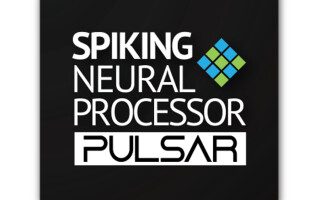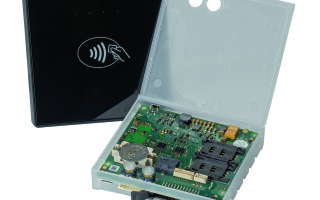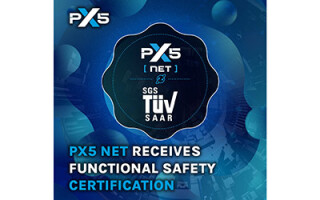Delivering Leadership Product Innovation and Reliability for Embedded Customers
February 25, 2025
Sponsored Blog

An interview with Sumit Shah, Senior Director, Adaptive & Embedded Computing Group, AMD
Embedded systems designers and engineers must consider many factors when selecting the right supplier. Product innovation, longevity, and a proven and trusted partner are always high on the list. And, from a technology perspective, customers want high-performance and power-efficient compute that is reliable, scalable, and supported for the life of the product. We interviewed Sumit Shah, senior director of the Adaptive & Embedded Computing Group at AMD, to learn about AMD embedded products and the company’s roadmap toward future innovations. We also dug into the growing importance and benefits of adaptive computing, including the versatile AMD Versal family, and how it is powering edge AI workloads.
Q) Customers are always looking to leverage the latest technologies to advance their designs. What are some key product innovations driving the adoption of AMD adaptive computing solutions?
A) AMD is committed to helping embedded customers deal with fast-growing data processing demands in edge applications. For example, AMD Versal adaptive SoCs empower architects to innovate with heterogeneous processors, cutting-edge IP, a streamlined software flow, and advanced packaging. These advances offer incomparable system-level performance per watt and the ability to scale compute resources to meet the exact needs of the application. This high level of compute efficiency also allows developers to deploy highly efficient AI inference processing.
AMD Versal devices also drive faster host connectivity. We recently introduced the Versal Premium Series Gen 2 adaptive SoCs—the industry’s first FPGA devices to support Compute Express Link (CXL) 3.1 and PCIe Gen 6 specifications in hard IP. This enables high-bandwidth host connectivity to accelerate data-intensive workloads. These devices also feature the industry’s fastest DDR5/LPDDR5 memory connectivity, and 400G High-Speed Crypto Engines to enable up to 2X faster secure data transactions versus the competition.
In addition, by pairing Versal Premium Series Gen 2 adaptive SoCs with AMD EPYC Embedded CPUs, system architects can leverage the latest technology from AMD, connected via CXL or PCIe, to accelerate data-intensive workloads. With CXL, there is an additional benefit of memory coherency, enabling true heterogeneous, accelerated computing, as well as memory pooling for better memory utilization.
Q) Product longevity and a predictable roadmap are critical considerations in choosing the right vendor and product. Why is AMD a company that customers can trust to deliver a reliable roadmap and long product lifecycles?
A) Predictability is a key competitive trait of AMD. Not only does the company offer a predictable roadmap with a well-articulated cadence of adaptive computing product innovations and lead times, but it also leverages a globally diverse supply chain to help minimize risk. AMD oversees its entire manufacturing supply chain, helping to ensure that its suppliers adhere to strict business continuity standards.
Designers should choose AMD for its trusted commitment to customers and proven decades of experience driving innovation through extensive research and development. AMD delivers the support that customers can count on, backed by dedicated FAEs and a network of regional specialists.
Our embedded customers require extended product longevity, typically requiring lifecycles of 15 years, with many products supported much longer. For example, AMD recently announced that select AMD FPGA and adaptive SoC devices will be supported through the year 2045.
Q) What are some recent product introductions across your embedded portfolio that you’d like to highlight for readers?
A) AMD offers a full suite of Versal adaptive SoC devices to fit any application across a broad set of embedded markets. We recently announced the expansion of the AMD Versal adaptive SoC portfolio with the introduction of the Versal RF Series that includes the industry’s highest DSP compute performance in a single-chip with integrated direct radio frequency (RF)-sampling data converters. The Versal RF Series offers precise, wideband-spectrum observability and up to 80 TOPS of digital signal processing (DSP) performance in a size, weight, and power (SWaP)-optimized design, targeting RF systems and test equipment applications in the aerospace and defense (A&D) and test and measurement (T&M) markets, respectively.
We also offer Versal AI Edge Series Gen 2 adaptive SoCs bringing preprocessing, AI inference, and postprocessing together on a single device for end-to-end acceleration of AI-driven embedded systems. These devices improve upon on the first generation with powerful new AI Engines expected to deliver up to 3X higher TOPs-per-watt versus first-generation devices, while newly integrated Arm CPUs are expected to offer up to 10X more scalar compute than first-generation products.
Also new to the Versal portfolio are the second-generation AMD Versal Premium and AMD Versal Prime adaptive SoCs. The Versal Premium Series Gen 2 adaptive SoC boosts overall system throughput and resource utilization for demanding data-intensive applications. The Versal Prime Series Gen 2 device offers up to 200k DMIPs of compute for complex decision making. Target applications include video processing, robotics, medical imaging, and industrial PCs.
Outside the Versal family, we recently introduced the AMD Spartan UltraScale+ FPGA, a new, cost-optimized and high I/O programmable device offering high performance and advanced security features in a low cost, power efficient design. We also recently announced the Alveo UL3524 adaptive accelerator card built for ultra-low latency trading.
Q) What are some embedded applications using AMD adaptive computing devices?
A) AMD FPGAs and adaptive SoCs are widely deployed in embedded markets. In the industrial space, AMD adaptive computing helps drive machine vision and motor control applications for robotics and factory automation. It can help manufacturing lines deploy AI-based inspections and enable digital twin simulations that can predict and avoid system failures. In healthcare, AMD adaptive computing is used to enable deterministic movement in surgical robots and helps enable AI-based imaging and inferencing in diagnostic equipment, such as ultrasound machines. In aerospace and defense, AMD adaptive computing drives positioning and navigation systems on rovers and satellites. It also helps with image detection and processing applications.
In the automotive space, adaptive SoCs are deeply embedded in advanced driver-assistance system (ADAS) safety systems. These devices help process data from radar and LiDAR sensors and cameras in real time, helping autonomous cars and drivers make quick safety decisions.
Subaru Corporation recently selected AMD Versal AI Edge Series Gen 2 devices for its next-generation ADAS vision system, known as Subaru EyeSight Driver Assist Technology. EyeSight technology is available in select Subaru car models to enable advanced safety features, including adaptive cruise control, lane-keep assist, and pre-collision braking. Subaru is also using AMD adaptive SoC technology in its current vehicles equipped with EyeSight.
Q) Demand for edge AI is growing, with new opportunities emerging in automotive and industrial markets. How is AMD positioned to take advantage of these opportunities?
A) Over the next several years, AI will continue to become more ubiquitous at the edge, and enterprises will need to look at heterogeneous, adaptable, and scalable solutions to meet their needs. AMD is well-positioned to lead these innovations with high-performance-per-watt, scalable solutions that accelerate data processing for real-time decision-making, and deliver advanced security and personalized experiences.
AMD has a broad and adaptable embedded computing portfolio including CPUs, FPGAs, adaptive SoCs, SOMs, and AI Engines to accelerate every phase of edge AI processing: preprocessing, inference, and postprocessing. This AMD heterogeneous, adaptive, and scalable approach helps customers optimize performance, efficiency, security, and memory bandwidth by targeting each task to the best processor available.
Automotive, industrial, and medical embedded systems increasingly leverage diverse sensor data for a wide range of applications. This sensor data must be processed and/or offloaded as quickly as it’s generated—at real-time speeds—to deliver maximum value and faster, smarter decisions. Adaptive computing excels at delivering the deterministic responsiveness and ultra-low latency processing these applications require.
As embedded processing engines move closer to the sensors, adaptive computing also provides flexible I/O connectivity with versatile communications and offload capabilities for enabling efficient AI inferencing, native sensor fusion, and other key capabilities.
Q) Any final thoughts?
A) There are many factors for engineers and system architects to consider when evaluating technology partners for their next-gen designs, especially if they are planning to integrate AI workloads. First, they need to choose a stable and reliable supplier and the right technology that can serve them over the life of their products. It’s also important to examine the portfolio offerings, product innovations, and adaptability of the supplier, and to ensure a predictable roadmap that can support them into the future.
The AMD Versal portfolio offers leading system-level performance and predictability that customers require from a proven and trusted partner committed to the long-term success of its customers. We believe that AMD, with its Versal adaptive SoC portfolio, is the first and obvious choice for adaptive computing today and tomorrow.
With multiple uncertainties in the market, AMD brings stability and a continued commitment to future growth through its solid roadmap investments. AMD also offers a vast end-to-end portfolio for embedded customers, including FPGAs, adaptive SoCs, and embedded processors, delivering the solutions needed for advanced AI workloads, all from one source. We are ready and able to help our customers get their products to market quickly.
More information about the AMD embedded portfolio can be found at amd.com.





